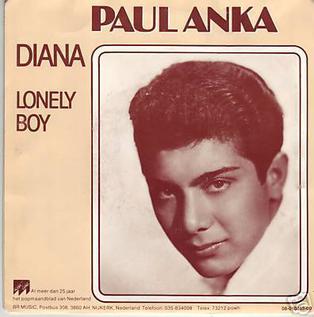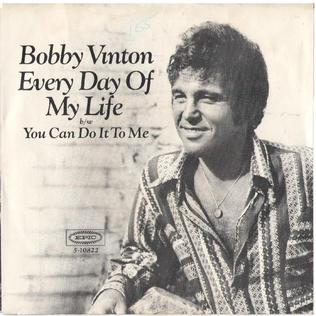Related Research Articles

"He" is a song about God, written in 1954. The song made the popular music charts the following year.

"Mr. Sandman" is a popular song written by Pat Ballard and published in 1954. It was first recorded in May of that year by Vaughn Monroe & his orchestra and later that year by The Chordettes and the Four Aces. The song's lyrics convey a request to "Mr. Sandman" to "bring me a dream" – the traditional association of the folkloric figure. The pronoun used to refer to the desired dream is often changed depending on the sex of the singer or group performing the song, as the original sheet music publication, which includes male and female versions of the lyrics, intended.
"Let Me Go, Lover!", a popular song, was written by Jenny Lou Carson and Al Hill, a pen name used by Fred Wise, Kathleen Twomey, and Ben Weisman. It is based on an earlier song called "Let Me Go, Devil", about alcoholism.
"It's Almost Tomorrow" is a 1955 popular song with music by Gene Adkinson and lyrics by Wade Buff. The song was actually written in 1953, when Adkinson and Buff were in high school. Hit versions were released in 1955 by The Dream Weavers, Jo Stafford, David Carroll, and Snooky Lanson.

"Diana" is a song written and first performed by Paul Anka, who recorded it in May 1957 at Don Costa’s studio in New York City. Anka stated in his autobiography that the song was inspired by a girl named Diana Ayoub, whom he had met at his church and community events, and had developed a crush on. Session musicians on the record included George Barnes playing lead guitar, Bucky Pizzarelli playing the "Calypso" riff on guitar, Irving Wexler on piano, Jerry Bruno on bass, and Panama Francis on drums. The song was recorded in May 1957 at RCA Studios in New York. Backup singers included Artie Ripp.
"Eddie My Love" is a 1956 doo wop song. According to BMI and ASCAP, the song was written by Maxwell Davis (BMI), Aaron Collins, Jr. (ASCAP), and Sam Ling (BMI). Maxwell Davis played sax on the Teen Queens record. Aaron Collins was the brother of the Teen Queens. Sam Ling was an alias of Saul Bihari, co-founder of Modern, RPM, and other labels.

"Ev'ry Day of My Life" is a popular song written in 1954 by Al Jacobs and Jimmie Crane.
"Feel So Fine" is a song released in 1960 by Johnny Preston. The song is a reworking of the 1955 song "Feel So Good" by Shirley & Lee, with modified lyrics.

"So Sad (To Watch Good Love Go Bad)" is a song written by Don Everly, which was released by The Everly Brothers in 1960. The song was later a country hit for multiple artists in the 1970s and 80s.
"Long Lonely Nights" is a song that was originally released by Lee Andrews & the Hearts in 1957. Hit versions were also released by Clyde McPhatter, later in 1957, and Bobby Vinton in 1965. The song was written by Lee Andrews, though Larry Brown, Doug Henderson, and Mimi Uniman were given songwriter credit as well, in a practice that was common at the time.
"(Remember Me) I'm The One Who Loves You" is a song written and originally sung by Stuart Hamblen, which he released in 1950. The song was a hit for Ernest Tubb the same year, and Dean Martin in 1965. Johnny Cash also covered it on his 1957 debut album Johnny Cash with His Hot and Blue Guitar!
"The Man in the Raincoat" is a song written by Warwick Webster, which was first released by Priscilla Wright in April 1955, and became a hit in the United States. Another hit version was released by Marion Marlowe later that year.
Billboard Top Country & Western Records of 1956 is made up of three year-end charts compiled by Billboard magazine ranking the year's top country and western records based on record sales, juke box plays, and jockey plays.
References
- 1 2 3 Pruter, Robert (1996). Doowop: The Chicago Scene. University of Illinois Press. p. 104. ISBN 9780252065064 . Retrieved April 29, 2018.
- 1 2 Baptista, Todd. "Playing It Cool: The Spaniels' 50 Years of Harmony – As published in Goldmine magazine, 2011", TRB Enterprises. Retrieved April 28, 2018.
- ↑ Koskoff, Ellen (2005). Music Cultures in the United States: An Introduction, Psychology Press. p. 231. Retrieved April 28, 2018.
- ↑ Dawson, Jim; Propes, Steve (2003). 45 Rpm: The History, Heroes and Villains of a Pop Music Revolution , Hal Leonard Corporation. p. 158. Retrieved April 29, 2018.
- ↑ The Book of Golden Rock 'N' Roll, Columbia Pictures Publications, 1987
- ↑ Gilliland, John (1969). "Show 11 – Big Rock Candy Mountain: Early rock 'n' roll vocal groups & Frank Zappa" (audio). Pop Chronicles . University of North Texas Libraries. Track 5.
- ↑ "The Billboard Music Popularity Charts – Rhythm and Blues Records", Billboard , June 5, 1954. p. 44. Retrieved April 28, 2018.
- ↑ Whitburn, Joel (2004). Top R&B/Hip-Hop Singles: 1942-2004. Record Research. p. 543.
- ↑ "The Billboard Music Popularity Charts – Rhythm and Blues Records", Billboard , July 17, 1954. p. 63. Retrieved April 28, 2018.
- ↑ "Rhythm & Blues Top 15", Cash Box , June 19, 1954. p. 31. Retrieved April 29, 2018.
- ↑ "1954's Top R&B Records", Billboard , December 25, 1954. p. 17. Retrieved April 29, 2018.
- ↑ "1954's Top R&B Records as Voted in the Cash Box Poll", Cash Box , December 25, 1954. p. 29. Retrieved April 29, 2018.
- ↑ Fred Bronson (2002). Billboard's Hottest Hot 100 Hits: Top Songs and Song Makers, 1955 to 2000. Billboard Books. p. 214. ISBN 9780823077380.
- 1 2 3 "The Billboard Music Popularity Charts – Popular Records", Billboard , August 14, 1954. p. 26. Retrieved April 28, 2018.
- ↑ "The Billboard Music Popularity Charts – Popular Records", Billboard , August 21, 1954. p. 34. Retrieved April 28, 2018.
- ↑ Gugin, Linda C.; St. Clair, James E. (2015). Indiana's 200: The People Who Shaped the Hoosier State , Indiana Historical Society. p. 54. Retrieved April 29, 2018.
- ↑ "1954's Top Popular Records", Billboard , December 25, 1954. p. 17. Retrieved April 29, 2018.
- ↑ "1954's Top Pop Records as Voted in the Cash Box Poll", Cash Box , December 25, 1954. p. 28. Retrieved April 29, 2018.
- ↑ "Goodnight, Sweetheart, Goodnight". Allmusic . Retrieved August 24, 2011.
- 1 2 "The Billboard Music Popularity – Country & Western Records", Billboard , September 11, 1954. p. 52. Retrieved April 28, 2018.
- ↑ "The Billboard Music Popularity – Country & Western Records", Billboard , September 18, 1954. p. 36. Retrieved April 28, 2018.
- ↑ "The 10 Top Folk & Western Best Sellers", Cash Box , August 28, 1954. p. 26. Retrieved April 29, 2018.
- ↑ "The Ten Folk and Western Disk Jockeys Played Most This Week", Cash Box , August 14, 1954. p. 29. Retrieved April 29, 2018.
- ↑ "Hillbilly, Folk & Western Juke Box Tunes", Cash Box , September 25, 1954. p. 27. Retrieved April 29, 2018.
- ↑ "1954's Top C&W Records", Billboard , December 25, 1954. p. 17. Retrieved April 29, 2018.
- ↑ "1954's Top Country Records as Voted in the Cash Box Poll", Cash Box , December 25, 1954. p. 36. Retrieved April 29, 2018.
- ↑ "The Nation's Top 50 Best Selling Records", Cash Box , July 24, 1954. p. 16. Retrieved April 29, 2018.
- ↑ "The Nation's Top Ten Juke Box Tunes", Cash Box , August 14, 1954. p. 4. Retrieved April 29, 2018.
- ↑ "The Ten Records Disk Jockeys Played Most This Week", Cash Box , August 14, 1954. p. 7. Retrieved April 29, 2018.
- ↑ "Honor Roll of Hits", Billboard , September 4, 1954. p. 20. Retrieved April 29, 2018.
- ↑ The Spaniels - Goodnight Sweetheart / Maybe, 45cat.com. Retrieved July 20, 2019.
- ↑ The Spaniels Goodnight Sweetheart, YouTube. Retrieved July 20, 2019.
- ↑ Thanks Ted!, The Dick Biondi Film, November 14, 2016. Retrieved April 28, 2018.